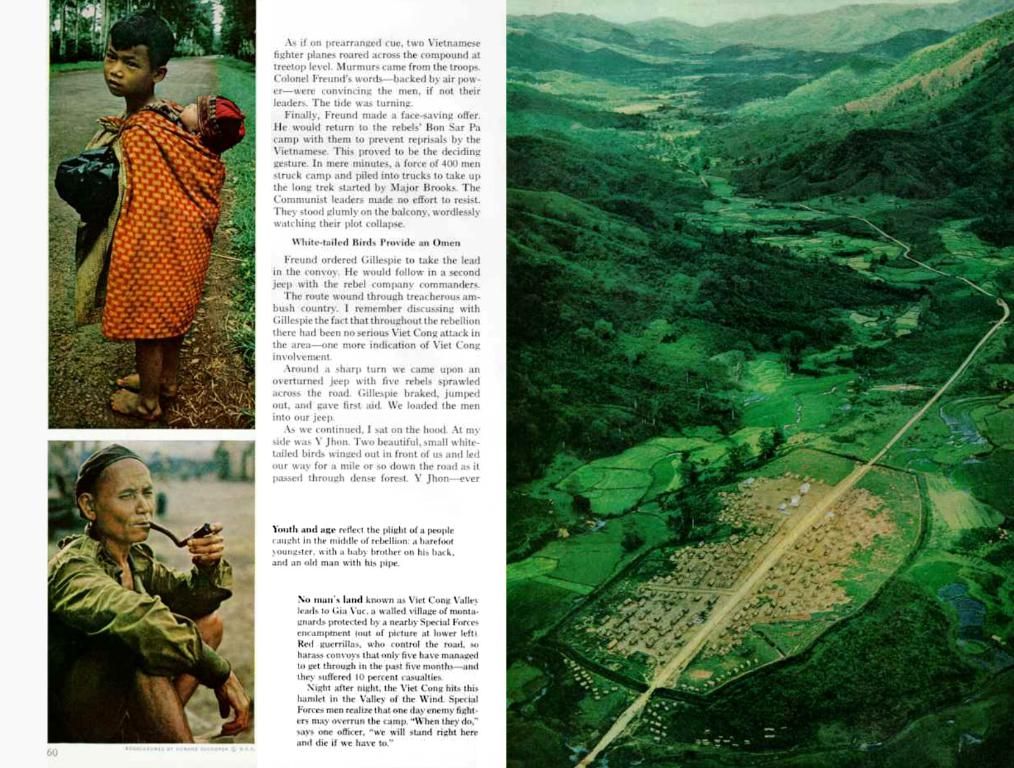Surviving the Full Year in a Tent: Comprehensive Guide for Year-Round Tent Living
Embracing the great outdoors and ditching your brick-and-mortar home for a cozy tent isn't just a whimsical dream; it's a lifestyle that's gained traction among those yearning for a simpler, nature-filled existence. Sounds intriguing? Let's dive into the nuts and bolts of year-round tent living, drawing from the wealth of experiences shared by fellow camping enthusiasts.
How to Settle Down Under the Canopy: Four Ways to Call a Tent Your 'Home'
Transforming a tent into your primary residence requires more than just hoisting a pole and unrolling a mat. The journey can vary greatly based on your preferences, budget, and long-term objectives. Here are four unique ways to embrace a tent as your permanent abode:
- Campground Chameleon: The free spirit within you yearns for the freedom that a nomadic life offers. Move every couple of weeks, soaking in the allure of diverse landscapes and meeting fellow travelers. Dispersed camping in national forests can offer a cost-effective option, or opt for organized campgrounds for added comfort and amenities, even if they come with a price tag. Just remember, life on the road has its challenges – basic facilities might be scarce, and costs can add up, especially during peak seasons.
- Claiming Your Stake: Having secure rights to pitch your tent on a plot of land provides stability. Build a more comfortable and elaborate camp, possibly equipped with facilities and outdoor furniture, making it feel more like a home. Whether you own the land or lease it from someone, your location could potentially offer a close-knit community or enjoy the benefits of solitude, depending on your agreement.
- Heavy-duty Encampment: Combining mobility with sturdiness, heavy-duty tents like canvas or yurts provide a stable living solution in almost any weather condition. These tents are equipped with amenities like wood-burning stoves and ample space, making them an ideal choice for winter camping. Although moving isn't as straightforward as folding up a regular camping tent, a well-researched and well-planned setup can ensure a hassle-free transition.
- Work-Exchange or Volunteering: Opportunities exist for exchanging labor for lodging in national parks, farms, or even private enterprises. These arrangements provide a blend of stability and mobility, offering savings on accommodation costs while allowing for an enriching, sustainable living experience. Just keep in mind that jobs can require you to commit to one location for a defined period.
- Hitting the Road in Style: If you're in search of more creature comforts along with the mobility that tent living offers, a van or RV might be your best bet. You'll enjoy all the benefits that tent living offers, plus the luxury of a comfortable bed and electricity. The catch? Your wallet will take a hit, especially when it comes to buying a vehicle, but for many, it's a worthy investment for increased comfort.
The Perks of Living Life in a Tent
Embarking on the adventure of tent living offers you more than just breathtaking sunrises and idyllic landscapes. Here are the freestanding reasons that draw people to tent living:
- Simplicity and Prioritization: Life in a tent forces you to declutter, both physically and mentally. This shift fosters a minimalist lifestyle that encourages you to prioritize what truly matters.
- Nature's Grandeur at Your Fingertips: The healing effects of nature never cease to awe – it's all around you when you live in a tent. From the gentle rustle of leaves in the morning to the lullaby of crickets at night, nature becomes your constant companion.
- Fiscal Freedom: Compared to traditional housing costs, living in a tent can save you a pretty penny. Whether you opt for free dispersed camping or paid campgrounds, the overall expenses are typically much lower.
- Freedom and Mobility: Tent living empowers you to roam free, whether you're in a nomadic setup or a more permanent one. While waking up to a new view every fortnight is exciting, the sheer act of being untethered from a conventional home provides a liberating sense of freedom.
- Eco-friendly Lifestyle: Tent living reduces your carbon footprint through reduced energy consumption, smaller living space, and sustainable practices like composting and solar power.
- Personal Growth: Adapting to tent living challenges you in ways you wouldn't anticipate. From battling inclement weather to confronting isolation, these experiences cultivate resilience, adaptability, and problem-solving skills. Life in a tent promotes self-discovery like few other choices can.
- Improved Health: Living off-grid can lead to better respiratory health thanks to reduced exposure to urban pollutants. Plus, the relaxation and stress-relieving qualities of nature's serene atmosphere contribute to overall well-being.
The Darker Side of Tent Living
While tent living offers a cornucopia of benefits, don't forget that it also comes with a few downsides. These challenges often test your mettle, but understanding them can help you better prepare:
- Inclement Weather: Tents provide minimal protection against the elements, and harsh winds, heavy rain, or snow can test your resolve. Preparation and the right equipment can help you brave Mother Nature's toughest conditions.
- Wildlife Encounters: From pesky squirrels to potentially dangerous predators, sharing space with nature's inhabitants is part of the package. Practicing wildlife safety and adopting protective measures can minimize potential issues.
- Sanitation and Utilities: Basic facilities like hot showers and plumbing may be scarce, especially in remote locations. Learning self-sustaining methods for waste disposal, water purification, and personal hygiene becomes essential.
- Remote Locations and Accessing Amenities: Camping in secluded spots can limit your access to grocery stores, hospitals, and town amenities. You'll need to plan ahead and be self-reliant in many cases.
- Lack of Community: Tent living can heighten feelings of isolation due to the transient nature of the lifestyle and limited social interactions. Developing a community online or staying connected through occasional forays into civilization can help mitigate this issue.
- Struggles with Legality: Navigating local laws and regulations related to long-term camping can be a challenge. Compliance with rules and staying informed about camping restrictions are vital to maintaining an uninterrupted living experience.
Tips for Maximizing Your Tent Living Experience
Adopting these tips can help ensure your tent living journey is smooth and rewarding:
- Invest in a High-Quality Tent: Your tent is your home, so it needs to be durable, weather-resistant, and comfortable. Do some research to find a tent that meets your needs and stands the test of time.
- Protect the Exterior of Your Tent: Apply additional waterproofing and use a fly sheet to prolong the life of your tent by shielding it from inclement weather, prolonged sun exposure, and wear and tear.
- Pick a Strategic Location: Consider factors like proximity to town and essential amenities to find a location that strikes the perfect balance between seclusion and convenience.
- Ensure Access to Basic Utilities: Having a water source, access to electricity, or the ability to harness solar power can make living in a tent easier and more comfortable.
- Winter Climate Considerations: Understand the winter climate before settling into your location; harsh weather conditions may require specialized equipment and preparations.
- Furnish Your Tent with Comfort: Don't just focus on the basics. Buy a comfy mattress, deck your tent with rugs, and add furniture that makes you feel at home.
- Wildlife Protection: Use reliable storage methods to keep your food safe from unwanted critters. Consult local guides and online resources to learn about specific precautions for your chosen location.
- Rainwater Collection: Set up a rainwater collection system to help meet your water needs while minimizing environmental impact.
- Educate Yourself About the Locale: Familiarize yourself with the local flora and fauna, understand the climate patterns, and learn about the area's potential risks.
Embracing Winter: Thriving in Cold Weather
Adapting to life in a tent during winter is all about preparation and embracing the harsh elements. Summoning warmth and combat uncomfortable condensation are essential elements of winter survival. The following recommendations can help you minimize the challenges and enjoy a comfortable winter in your tent:
- Insulate Your Tent: Insulate your tent with the right combination of sleeping bag, thermal clothing, and ground insulation for optimal warmth.
- Address Condensation: Proper ventilation is essential to keep condensation at bay during winter. Ensure your tent is well-ventilated to maintain breathability and airflow.
- Utilize a Heat Source: Whether it's a portable heater, a wood-burning stove, or a campfire, having a reliable heat source can make all the difference during winter's coldest nights.
The Big Picture: Where to Stake Your Claim
Establishing a year-round home in a tent isn't easy, as it demands careful consideration of your location, legalities, and adaptability. Understanding the potential options available can help you make an informed decision:
- Private Land: Owning or leasing a plot of land offers the most control and stability. Be sure to research your local zoning laws, as some regions have restrictions against living in a tent for extended periods.
- Campgrounds: Some campgrounds offer year-round stays, albeit at a premium. These facilities typically provide amenities like restrooms, showers, and vehicle parking.
- National Forests and BLM Lands: In the U.S., national forests and Bureau of Land Management territories often allow dispersed camping for up to 14 days within a 28-day period. When the 14-day limit expires, you need to move at least 25 miles away.
- Work-Exchange Programs: These programs offer accommodation in exchange for work in national parks, farms, or retreat centers. You might even luck out and find one with camping-friendly accommodations.
- Mild Climate Areas: Choosing an area with a relatively mild climate makes for an easier winter and more comfortable life in general.
- Overseas Options: Countries like New Zealand, Southeast Asia, and Scandinavia offer beautiful landscapes suited for tent living, but local laws may vary. Be sure to research regulations before setting up camp.
Venturing Out Short-Term? You'll Be Surprised: Tents for Long-Term Camping
Ready to embark on a few months of tent living? Fear not! The experience can be just as enriching as a full-time lifestyle. With careful planning, quality equipment, and a determined spirit, you can thrive while tent living temporarily. Here are tips for making the most of your short-term tent living adventure:
- Research Your Location: Choose a location that meets your needs for climate, amenities, and consistency.
- Plan for Essentials: Invest in quality, reliable camping gear, from your tent to your cooking equipment.
- Prepare for Sustainability: Plan for water, food, and sanitation needs, especially when venturing into remote areas.
- Stay Safe: Know your surroundings and take the necessary precautions when it comes to weather, wildlife, and other potential risks.
- Maintain Your Equipment: Keep your tent and gear in good condition to ensure your comfort and safety during your stay.
- Follow Local Laws: Understand and comply with local regulations regarding camping and land use.
- Prepare for Departure: Develop a plan for exiting your tent living experience, whether it's returning to a traditional home or transitioning to a new phase in your adventure.
- Rather than roaming aimlessly, consider joining the community of property owners who have turns a tent into a more fixed residence on personal land or a rental plot.
- Embrace the versatility of extra-large tents, such as teepees, domes, or yurts, providing ample space for entertaining guests during outdoor fashion-and-beauty or food-and-drink events.
- To enhance the lifestyle aspect of camping, decorate your tent with accents like colorful rugs, candles, or fairy lights to create a warm, inviting ambiance.
- Invest in a stylish camping wardrobe, complete with trendy parkas, waterproof boots, and fashionable hats, elevating your outdoor attire.
- Spruce up your home-and-garden with high-quality, portable furniture, like camping chairs and tables, for instant comfort and aesthetics.
- Incorporate educational resources and self-development tools, like e-books or online courses, to improve your knowledge base and stimulate personal growth during your tent living journey.
- During warmer months, take advantage of the outdoors by incorporating outdoor cooking stations, hammocks, or even arobin nesting boxes into your tent living setup.
- Embrace nature's calming influence by incorporating natural elements, like rocks, wood, or plants, into your tent's design for a harmonious coexistence with the environment.
- Make the most of your evenings by cozying up around a campfire, sharing stories, and indulging in gourmet campfire recipes, enhancing the overall adventure experience.








